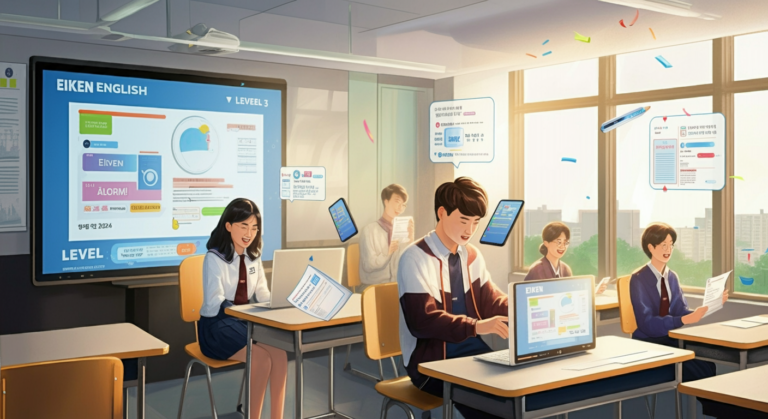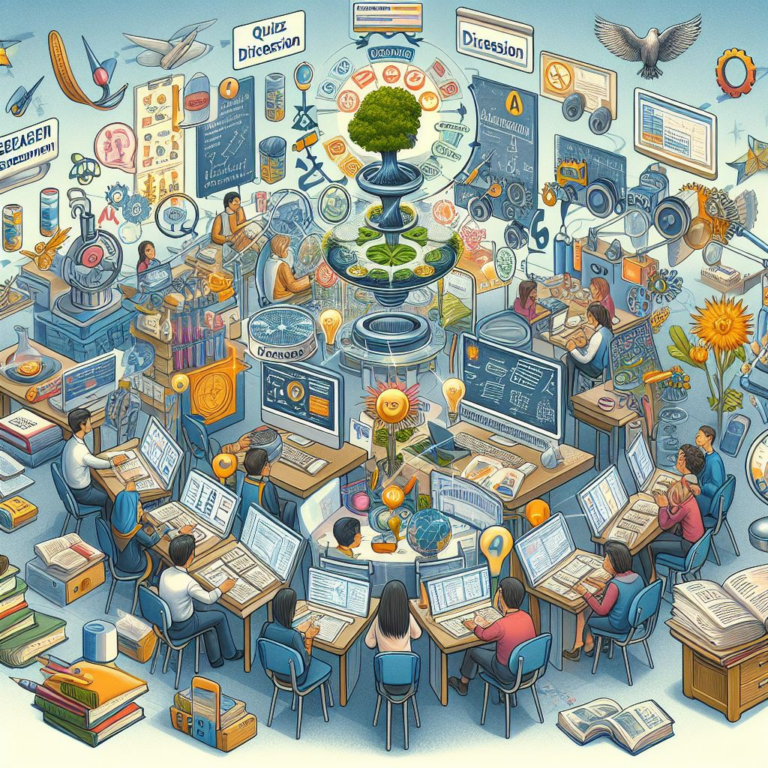AI and Language Learning
Artificial Intelligence in Teacher Education: Lessons and practices from a Community of Practice
AI-Generated Summary Podcast
ONE-SENTENCE TAKEAWAY
Educators are exploring AI’s potential to enhance teaching, learning, and collaboration within communities of practice.
SUMMARY
- Shirin Soyes, Elena Oncevska-Egar, Diana Morbedadze, Janet Ayub, Silvia Rettaroli, and Zarina Zakhanova discussed AI in teacher education.
- They presented lessons and practices from a Community of Practice (COP) for teacher educators, focusing on AI integration strategies, challenges, and benefits.
- The speakers shared experiences and collaborative outputs from the COP, highlighting the role of AI in formative assessment, lesson planning, and developing guidelines for safe AI usage.
IDEAS
- AI is the new worldwide web and it’s here to stay.
- AI in education requires ongoing engagement and study.
- A community of practice is the best approach to learn about AI.
- The community of practice framework by Wenger has three components: domain, community, and practice.
- The community of inquiry framework by Garrison has three components: teaching presence, social presence, and cognitive presence.
- The practical inquiry model provides clear stages to design communities of practice.
- AI can be overwhelming for newcomers due to the many emerging tools and publications.
- Teachers need more opportunities to provide formative feedback.
- AI can help teachers provide more feedback and save time.
- AI can be used as a feedback assistant, not a replacement for teacher expertise.
- Formative assessment is a big challenge for teachers, especially providing personalized feedback.
- AI can help teachers provide constructive feedback without overwhelming them.
- Structured prompting is important for getting better feedback from AI.
- AI can be used to simulate peer feedback.
- Students are already engaging with AI technologies.
- AI integration in education requires a framework and guidelines.
- Students must properly cite AI tools used in their work.
- Students must ensure their final work reflects their own creativity and critical thinking.
- Students should brainstorm and generate their own ideas before using AI.
- Students should write specific and focused prompts to maximize the effectiveness of AI tools.
- Students should regularly reflect on how AI affects their learning.
- Data protection is important, including anonymizing personal information.
- Using respectful language with AI helps generate respectful and collaborative output.
- AI can shape the way we solve problems, but core principles remain timeless.
- We should check the information we get from AI to avoid bias and faulty thinking.
- AI-powered lesson plans can engage students, enhance learning, and empower teachers.
- AI can transform static lessons into dynamic interactive experiences.
- AI-powered quizzes and simulations make learning fun and reinforce key concepts.
- AI supports differentiated instructions, creating inclusive classrooms.
- Personalized learning experiences boost student engagement and motivation.
- Collaboration and reflection activities build empathy and social emotional skills.
- AI tools can encourage critical thinking in students.
- AI tools are free, accessible, easy to use, and promote learning autonomy.
- AI tools can save time and enhance teaching effectiveness.
- Communities of practice provide a supportive environment for learning and collaboration.
- Clear communication, planning, and negotiation are vital for successful collaborative outputs.
- Participating in a community of practice can help develop AI literacy and prompting skills.
- Blocking off time for professional development is important.
- AI literacy is crucial for teachers to support students in developing theirs.
- Communities of practice can foster deeper insights and personal growth.
- AI resources can become outdated quickly, requiring regular updates.
- AI tools rely on data, raising privacy concerns.
- Cognitive overload from the abundance of AI tools and resources can lead to disengagement.
- Collaborative outputs can be challenging when members are unresponsive or unavailable.
- Conflict in priorities and design inclusivity can pose challenges in communities of practice.
- Communities of practice should be based on real practical experiences.
- Clear objectives and steps are essential for effective community engagement.
- Addressing diversity and inclusion in experience is crucial for a healthy exchange of ideas.
- Communities of practice should provide support and resources while pushing participants out of their comfort zones.
- Developing resilience, problem-solving, and critical thinking are important human skills in the age of AI.
- AI can enhance personalized learning by adapting instructional materials and offering tailored feedback.
- AI-driven insights can enable teachers to address individual learning gaps and provide targeted support.
- AI can be used as a tool to empower teachers and students, not to replace them.
- Teachers should teach students to question the reliability and relevance of AI-generated output.
INSIGHTS
- Communities of practice offer a powerful platform for educators to explore AI in education and develop practical integration strategies.
- AI tools can enhance teaching and learning by providing personalized feedback, facilitating differentiated instruction, and promoting student engagement.
- It is crucial to address ethical considerations, data privacy, and the potential for AI to stifle creativity when integrating AI into education.
- Developing AI literacy among teachers and students is essential for navigating the evolving landscape of AI in education.
- Collaborative projects within communities of practice foster deeper understanding, skill development, and a sense of shared responsibility.
- The rapid evolution of AI necessitates ongoing engagement, critical thinking, and a willingness to adapt and learn.
- AI should be viewed as a tool to empower both teachers and students, enhancing human capabilities rather than replacing them.
- Establishing clear guidelines, promoting responsible AI usage, and fostering a culture of reflection are vital for maximizing the benefits of AI in education.
- By embracing a collaborative and learner-centered approach, educators can leverage AI to create more inclusive, engaging, and effective learning experiences.
- The insights gained from communities of practice can inform the development of AI-powered tools and resources that address the specific needs of diverse learners.
QUOTES
- “AI has become our new worldwide web, and it’s not a distant possibility, it’s not a choice anymore, and it’s here to stay.”
- “AI is a complex technology that requires ongoing engagement and study.”
- “For someone who has just started learning about AI, it can be quite overwhelming because there are so many tools emerging, so many publications.”
- “AI is not just a tool for measuring progress. It plays a pivotal role in shaping the entire learning process.”
- “It’s much more than checking for understanding. It’s about guiding students along their learning journey, offering them timely feedback.”
- “How can teachers ensure that learners receive the feedback they need to move forward?”
- “How can we teacher educators support teachers in providing constructive feedback without overwhelming them?”
- “AI tools are free, premium, accessible for all, easy to use, and require no student login.”
- “Promote learning autonomy, creativity, and adaptability for different languages, levels, and objectives.”
- “AI tools are designed to be engaging and supportive as the chatbot is assisting in the process.”
- “This collaborative project empowers teachers to use AI for innovative lesson planning, leading to better teaching outcomes and student success.”
- “I think it should be the teacher doing the designing and the AI could be more usefully used as a kind of support, as a kind of prompter, if you like.”
- “I think we should turn things upside down really. We should prompt the machine to prompt us to think better.”
- “AI resources can become outdated quickly. So you need to check them.”
- “AI tools rely on our data. And if you ask your participants to use some tools, or if you encourage your community members to use some tools, then they need to be aware of the fact that their data is used.”
- “The community shouldn’t be too easy for participants or too comfortable for them. So pushing participants a little bit away from their comfort zones can help.”
- “These are the human skills that we need in this world with AI so that we would like to promote further with our learners as well.”
HABITS
- Engage in continuous learning and exploration of AI in education.
- Collaborate with other educators to share experiences and insights.
- Reflect on the ethical implications of AI and its impact on teaching and learning.
- Experiment with different AI tools and prompting techniques to find what works best in your context.
- Prioritize data privacy and security when using AI tools.
- Foster a growth mindset and encourage students to embrace challenges and learn from mistakes.
- Promote critical thinking and problem-solving skills in students.
- Encourage students to reflect on their learning and how AI affects it.
- Seek out opportunities for professional development and collaboration within communities of practice.
- Stay informed about the latest developments in AI and its applications in education.
FACTS
- AI has become a ubiquitous technology that is rapidly transforming various aspects of society, including education.
- Communities of practice provide a valuable framework for fostering collaboration, knowledge sharing, and professional development among educators.
- Formative assessment plays a crucial role in shaping the learning process and providing students with timely feedback.
- AI tools can be used to personalize learning experiences, adapt instructional materials, and offer tailored feedback.
- Ethical considerations, data privacy, and the potential for AI to stifle creativity are important factors to consider when integrating AI into education.
- AI literacy is becoming increasingly important for both teachers and students to navigate the evolving landscape of AI in education.
REFERENCES
- AI Roundtable: A community of practice launched in February 2024 for teacher educators from 18 countries.
- Community of Practice Framework by Wenger: A framework with three components – domain, community, and practice.
- Community of Inquiry Framework by Garrison: A framework with three components – teaching presence, social presence, and cognitive presence.
- Practical Inquiry Model: A model that provides clear stages to design communities of practice.
- ChatGPT-4: An AI model used for generating narrative feedback.
- Claude Sonnet: An AI model used for providing analytical feedback.
- Noticing: A platform that provides support for writing.
- MOLIC and MOLIC 2023: Resources that provide pre-written prompts for using AI in different roles.
- Teaching English: A website by the British Council with articles and examples of AI prompts for teaching English.
- MISU: An AI tool that can be used for creating chatbots and providing feedback.
RECOMMENDATIONS
- Join or create a community of practice focused on AI in education to collaborate with other educators and share experiences.
- Explore different AI tools and frameworks to understand their potential benefits and limitations in your teaching context.
- Develop clear guidelines for AI usage in your classroom, addressing ethical considerations, data privacy, and academic integrity.
- Experiment with AI-powered tools for providing personalized feedback, creating interactive lessons, and promoting student engagement.
- Encourage students to use AI responsibly and critically, emphasizing the importance of original thinking and creativity.
- Foster a culture of reflection and continuous learning around AI in education, staying informed about the latest developments and best practices.
- Collaborate with technology experts and researchers to develop AI-powered solutions that address specific challenges in your educational context.
- Advocate for responsible AI development and implementation in education, ensuring that it serves to empower both teachers and students.
- Share your experiences and insights with other educators through publications, presentations, and workshops to contribute to the growing body of knowledge on AI in education.
- Prioritize the development of AI literacy among teachers and students, equipping them with the skills and knowledge to navigate the evolving landscape of AI in education.





